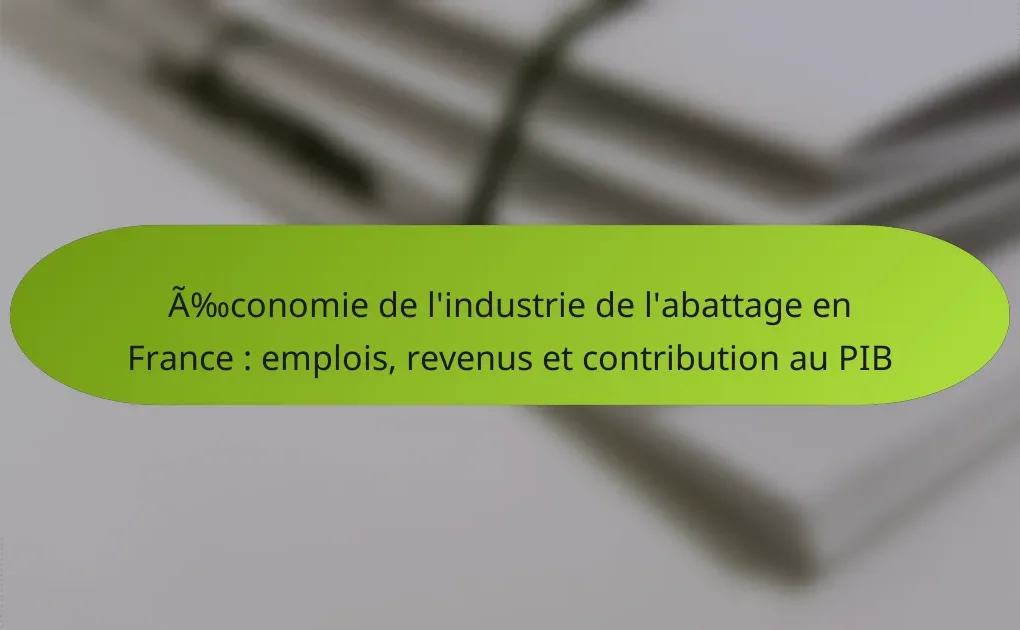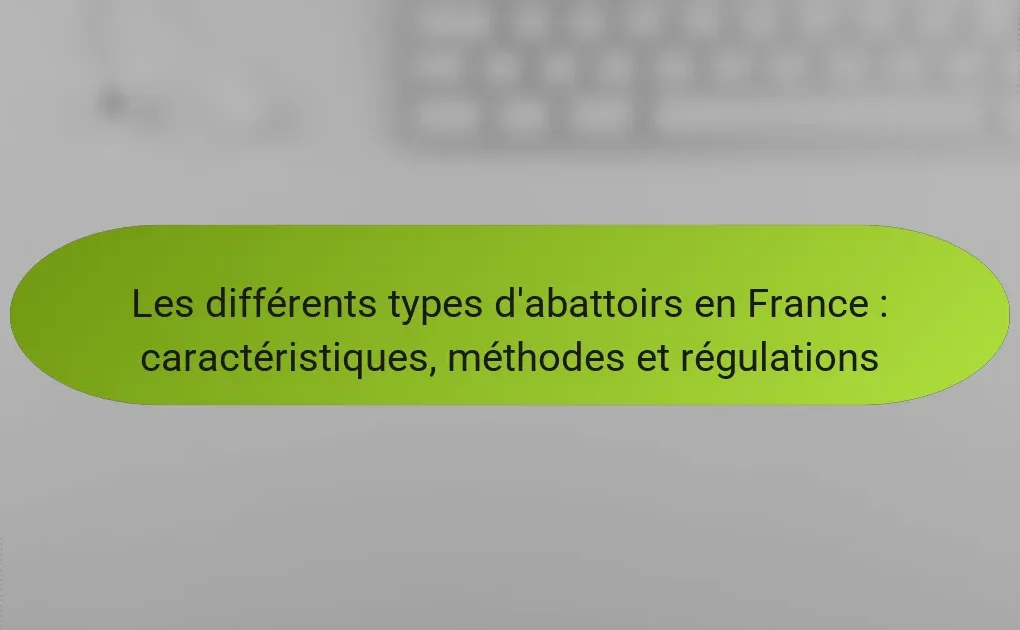
Bienvenue sur Arcadie-SO
Bienvenue sur Arcadie-SO, votre ressource incontournable pour tout ce qui concerne l'industrie des abattoirs en France. Ici, nous nous engageons à vous fournir des informations précises et à jour sur les pratiques, les réglementations et les innovations qui façonnent ce secteur vital. Que vous soyez un professionnel du domaine, un étudiant curieux ou simplement intéressé par notre patrimoine agricole, vous trouverez ici une richesse de connaissances.
Notre objectif est de promouvoir la transparence et la durabilité au sein de l'industrie de la viande. Nous croyons qu'il est essentiel d'explorer les défis et les opportunités auxquels le secteur est confronté, tout en célébrant le savoir-faire artisanal qui a fait la renommée des abattoirs français. Rejoignez-nous dans ce voyage informatif et engageant pour mieux comprendre les enjeux clés qui touchent notre industrie.
Explorez nos thématiques :
- Normes et réglementations en matière de sécurité alimentaire
- Technologies et innovations dans le secteur
- Éthique et bien-être animal
- Impact environnemental et durabilité
- Formation et carrière dans l'industrie des abattoirs
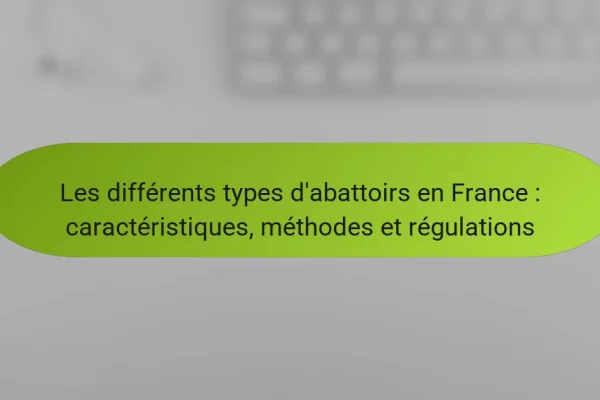
Les différents types d’abattoirs en France : caractéristiques, méthodes et régulations
The article focuses on the role of health authorities in regulating slaughterhouses, ensuring food safety and animal welfare. It details how these authorities establish public health standards, conduct regular inspections, and enforce compliance with hygiene and slaughter conditions. Key challenges faced by health authorities include maintaining food safety standards, ensuring product traceability, and addressing resource…

Formation du personnel sur la sécurité alimentaire dans les abattoirs
The article focuses on the training of personnel in food safety within slaughterhouses, emphasizing the importance of educating employees about safe food handling practices. Key topics covered include personal hygiene, equipment cleaning, waste management, traceability procedures, and regulatory compliance. Studies indicate that effective training can significantly reduce foodborne illness risks, with the World Health Organization…
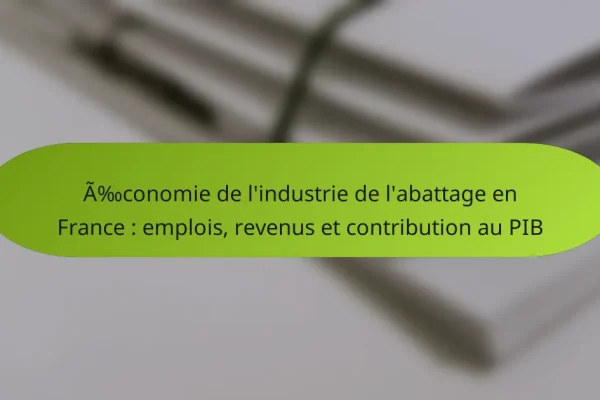
Économie de l’industrie de l’abattage en France : emplois, revenus et contribution au PIB
Abattoirs bio in France are facilities where animals are slaughtered according to strict organic standards that prioritize environmental respect and animal welfare. These establishments must adhere to specific regulations, including the prohibition of antibiotics and growth hormones, while ensuring humane treatment throughout the slaughtering process. Certification by accredited organizations guarantees compliance with European organic standards,…

Évolution de la réglementation des abattoirs en France : lois et impacts
The article examines the evolution of slaughterhouse regulations in France, highlighting key laws and their impacts on animal welfare and food safety. It traces significant legislative milestones, starting from the 1964 law focused on sanitary standards, through the 1995 reforms enhancing slaughter conditions, to the 2018 law expanding traceability obligations. The piece emphasizes the role…

Les enjeux éthiques de l’industrie de l’abattage en France : débats, opinions et solutions possibles
The ethical challenges of the slaughter industry in France encompass animal welfare, transparency, and sustainability. Animal welfare is a primary concern, raising questions about the living conditions and slaughter practices of animals, while French legislation sets standards that are sometimes violated. Transparency is essential for consumers who seek to understand the origins of their products…
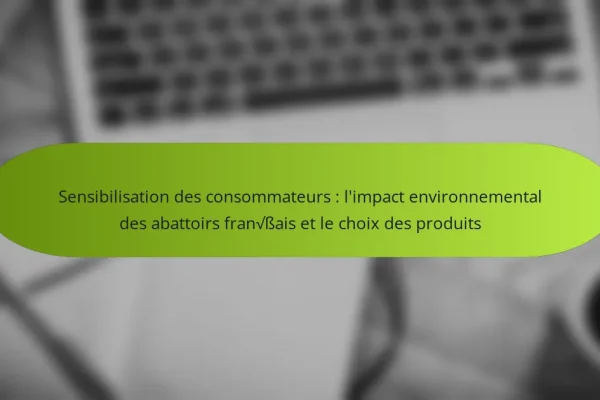
Sensibilisation des consommateurs : l’impact environnemental des abattoirs français et le choix des produits
The article focuses on consumer awareness regarding the environmental impact of French slaughterhouses. It highlights that these facilities significantly contribute to greenhouse gas emissions, with livestock accounting for 14.5% of France’s total emissions. Key products affected include beef, pork, and poultry, which are associated with high environmental costs, including water consumption and organic waste generation….
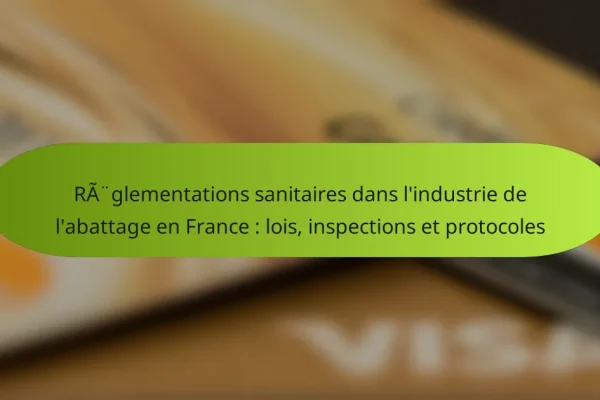
Règlementations sanitaires dans l’industrie de l’abattage en France : lois, inspections et protocoles
The article focuses on the sanitary regulations in the slaughter industry in France, primarily governed by Regulation (EC) No. 853/2004, which sets specific hygiene standards for food products. It outlines the legal requirements for the transport and slaughter of animals, emphasizing the necessity for registered establishments to undergo regular veterinary inspections. Additionally, the article discusses…

Impact environnemental des abattoirs français : émissions de gaz à effet de serre et gestion des déchets
The article examines the environmental impact of French abattoirs, highlighting their significant contribution to greenhouse gas emissions, particularly methane and carbon dioxide, which account for approximately 14.5% of France’s total emissions. It discusses the challenges of waste management in abattoirs, including the risks of soil and water contamination from organic waste. Furthermore, the article emphasizes…

Abattoirs bio en France : certification, pratiques et marché
Qu’est-ce qu’un abattoir bio en France ? Un abattoir bio en France est un établissement où les animaux sont abattus selon des normes biologiques strictes. Ces normes garantissent que les animaux ont été élevés dans des conditions respectueuses de l’environnement et de leur bien-être. Les abattoirs bio doivent respecter des réglementations spécifiques, comme l’interdiction d’utiliser…

Importance de la traçabilité dans la sécurité alimentaire des abattoirs
Traceability is essential for food safety in slaughterhouses, enabling the monitoring of each stage in the production chain, including animal identification, origin, and farming conditions. It plays a critical role in swiftly recalling contaminated products, as 60% of food contamination cases are linked to animal-derived products, according to the European Food Safety Authority. Implementing effective…

